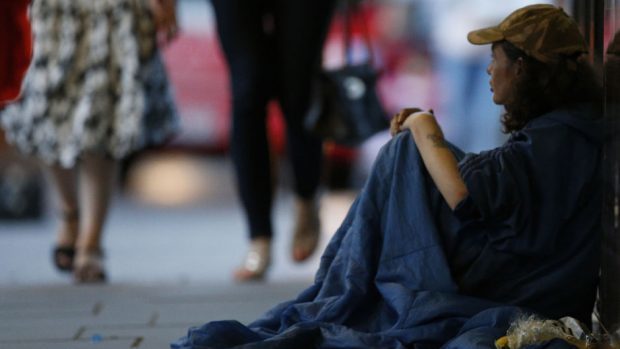The girl’s face, I remember, seemed blanched and was framed with straggling waves of dark hair. She was young but her pale skin had the grey pallor of sickliness, her hooded eyes surrounded by dark circles.
More even than the physical characteristics, though, it is her aura that I recall: desperation inhabited her. It vaporised from her slight, will-o’-the-wisp presence, from the hopelessness deep in her eyes. She appeared at my side out of the late-night sea of Euston station before I saw her coming. Did I have any change?
What happened next made a deep impression. I knew two things when I finally walked away from her: that I would write about her one day, and that I didn’t want to. Because the honesty required to do so would mean looking at me as well as her and that would be painful. There would be guilt involved. So, let me prevaricate for another few minutes while I tell you why I am writing this now.
Exit3, Westminster tube station underpass, London. Not the most illustrious address but home to a group of around 10 homeless people who slept in the tunnel leading to parliament. Their self-imposed rules were stringent. No begging. No drugs. No rowdy behaviour. Sleeping bags were laid out after 11pm and everyone rose by 6am before parliament’s business began. Apparently, they even asked Transport for London for a broom to clean the tunnel but were refused, “for health and safety reasons”. Legislation doesn’t prevent people sleeping rough but apparently it stops them sweeping up.
It was in Exit 3 that a man died earlier this year, in the freezing cold of a February night. Labour leader, Jeremy Corbyn, left flowers and a hand-written card saying, “This should never have happened. As a country, we must stop walking by.” Given that response, and the symbolic significance of the death happening just metres from parliament, you might expect something to have changed in the six months since.
It has. This week, the Exit 3 group were evicted from the relative safety of the tunnel. Solve the problem? No, just move it on. Westminster constituency had a 16% increase in rough sleepers last year, yet local Tory MP Mark Field – suspended from cabinet for hustling a Greenpeace protester out of a dinner by the scruff of the neck – denounced a local homeless charity last month as “a magnet for undesirables”. Such language de-humanises, makes it easier to sweep people under the societal carpet like inconvenient human debris, discarded easier than old chip papers.
Housing is a devolved matter and in Scotland, councils have a statutory duty to assist all homeless people. But numbers of homeless households have risen for the second year, up another 2% to 29,894. Few things leave you more vulnerable – or more frightened – than being without the basic human need for shelter. Life expectancy for rough sleepers is just 43. Yet anti-homeless measures in Britain include pavement spikes, water sprinklers, and chains on park benches. This issue needs an epiphany, a change of heart as much as of policy.
I had that in Euston station. Fishing out two pounds from my pocket, I gave it to the girl. Did I know any cheap hostels? I didn’t. She knew of one but it was 12 pounds. She sat down on a bench suddenly, her head in her hands. She looked so thin and tired. Did she have something to eat? She held up an almost empty, crumpled brown paper bag. I glanced up at the food bars around. Could I buy her something? “It’s okay,” she said, her voice a cocktail of gratitude and hopelessness. “Thanks for helping.” I didn’t know what to do. Her refusal released me and I moved on.
Except it didn’t release me. Waiting for my train north, I bought a coffee. It cost 2.90. I hadn’t even given her the cost of a coffee. She said the hostel cost 12 pounds. Why hadn’t I given her it? She seemed so vulnerable. Yes, it was short term but today is all we have. Maybe tonight, she was my responsibility and tomorrow, someone else’s.
I drained the cup and went looking for her. I found her but a man in a suit was talking to her. I watched uneasily, hoping to get her on her own, give her a choice. But she walked into the distance with him and I wondered what she walked to. Kindness or exploitation?
None of us can individually save the world but collectively, we can do better. I had walked away because I felt helpless and didn’t know what to do. Because, like most people, I have been stung a few times and was suspicious. Because she might be a fraud. Because, because, because. But the real ‘because’ is that I didn’t care enough until it was too late. Therein lies the shame, the reason it has taken months to write about this. I see her face in every homeless person I pass now – and I hope I always do. Because it will ensure next time will be different.
Catherine Deveney is an award-winning investigative journalist, novelist and television presenter

